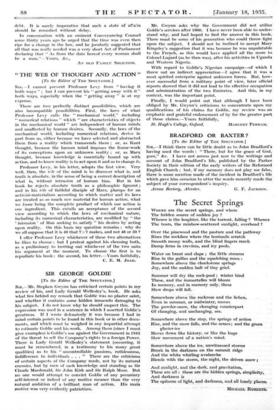" THE WEB OF THOUGHT AND ACTION " [To the
Editor of THE SPECTATOR.] SIR,—I cannot prevent Professor Levy front " having it both ways " ; but I can prevent his " getting away with it" both ways, especially when the "getting away " is at my expense.
There are two perfectly distinct possibilities, which are also incompatible possibilities. First, the laws of what Professor Levy calls the " Mechanical ' world," including " numerical relations " wh ich " are characteristics of objects in the mechanical world " are independent of human minds and unaffected by human desires. Secondly; the laws of the mechanical world; including numerical relations, deriVe in part from us, either because we have selected and abstracted them from a reality which transcends them ; or, as Kant thought, because the human mind imposes the frame-work of its -conceptions upon an unknown reality ; or, as Marx thought, because knowledge is essentially bound up with action, and to know reality is to act upon it and so to change it.
Professor Levy, in his letter, adopts the first view. Very well, then, the role of the mind is to discover what is, and truth is absolute, in the sense of being a correct description of what is, without intrusion of human bias. But in his book he rejects absolute truth as a philosophic figment ; and in his role of faithful disciple of Marx, plumps for an activist-materialism according to which matter and its laws are treated as so much raw material for human action, what we know being the complete product of which our action is one ingredient. This entails an acceptance of the second view according to which the laws of mechanical nature, including its numerical characteristics, are modified by " the ` intrusion' of Man seeking to satisfy " his desires by acting upon reality. On this basis my question remains : why do we all suppose that it is 49 that 7x 7 makes, and not 48 or 50 ?
I offer Professor Levy whichever of these two alternatives he likes to choose ; but I protest against his choosing both, as a preliminary to trotting out whichever of the two suits his argument at the moment. To choose the first is to repudiate his book : the second, his letter.—Yours faithfully,
C. E. M. JOAD:






































 Previous page
Previous page